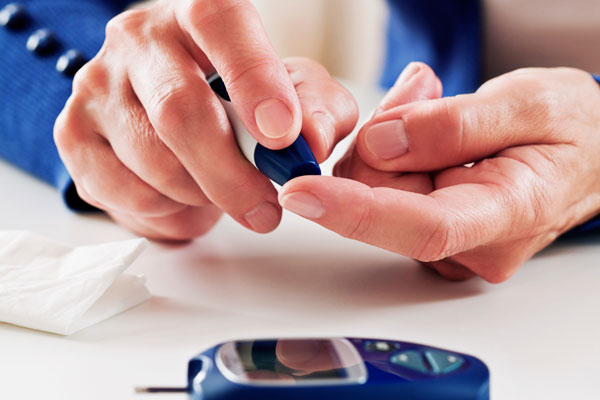Hi everyone!
According to the website, diabetes.org, 30 million Americans are living with diabetes. While that may be shocking, estimates show that nearly 8 million of those people may not even know they have it. Not only are they at risk from serious complications like stroke, kidney disease, and heart disease but they are also at a greater risk for gum disease.

A recent study conducted by NYU’s College of Nursing and Dentistry indicates that using gingival blood for the hemoglobin testing (HbA1c) produced nearly the exact same values as those values obtained from samples using blood from the Finger stick test. (This common test allows health professionals to check for blood glucose levels.) Given that most people see their dentist more consistently than their doctors; this can be an opportunity to bring increased awareness about the importance of a diabetes screening. At the very least early detection at a dental visit, and even early treatment, may help with the delay or the prevention of long-term complications caused by undiagnosed diabetes.
This isn’t the first study to bring the relationship between diabetes and periodontal disease into the spotlight. Previous research indicated that the relationship between diabetes and gum disease may go hand-in-hand. While diabetes places people at a greater risk for developing periodontal disease, people who are not diabetic but who show serious signs of gum disease may unknowingly affect their blood glucose levels and contribute to its progression. Just like diabetes, gum disease can and will affect your entire body. To make matters worse, studies seem to indicate that the presence of gum disease makes it very difficult to control your blood sugar, and uncontrolled blood sugar makes it very difficult to control gum disease. Quite a conundrum!
If you’re a diabetic and have difficulty controlling your blood glucose levels, here are some dental issues to watch for:
- Tooth decay. Of course, we all have to be mindful of brushing, flossing and seeing the dentist to keep cavities away, but diabetics have it a little tougher. We all have harmful bacteria in our mouth from the abundance of starches and sugars we ingest daily from food and drinks. Left unattended, the bacteria turns into a biofilm known as plaque, and it’s the acids in that plaque that harms the surface or the enamel of our teeth causing cavities. So if you’re a diabetic you may have a higher blood sugar level than normal, which means a higher level of sugar and starches and the acid that causes cavities. This is where twice-daily brushing and flossing once a day is so important.
- Dry mouth. Diabetics are also susceptible to dry mouth. With a lack of saliva present in the mouth, the greater chance the acid in the plaque has to sticking around and causing cavities. Again, regular brushing and flossing is really important, but so is watching your blood sugar levels.
- Advanced gum disease otherwise known as periodontitis. Gum disease is found to be more severe among people with diabetes since it lowers a person’s ability to resist infection and slows the healing process. (Remember, what we said about high blood sugar levels mean more starches and sugars and their cavity-causing acid flourishing inside your mouth?) Well without the necessary infection –fighting controls in place, gingivitis can quickly become periodontal disease. If gum disease is controlled and managed properly, it can also improve your blood sugar level. In the world of modern science, it’s definitely a two-way street.
- Diabetics can also develop a fungal infection called oral thrush or candidiasis. This yeast infection causes white patches in your mouth which can be very painful and sometimes bleed. People with weakened immune systems, like those with poor health, the very old or young and others with systemic diseases like diabetes are at risk at developing this infection. Even medication can put you at risk, like steroids, antibiotics, and some cancer therapy drugs. It’s also very common among people who wear dentures who do not remove them frequently enough. So it’s important to remember, if you wear dentures, clean them at least twice a day minimum and your dentures should be removed while sleeping as this helps the natural self-cleaning mechanisms of the oral cavity restore a harmonious healthy balance of oral flora. (You wouldn’t think of wearing your shoes to bed every night, would you?)
If you should develop sores that bleed or are just painful, be sure to contact your dentist. With a proper examination, we can prescribe medication that can kill the fungi involved and ease some of that discomfort.
To prevent gum disease and other dental problems, it’s important that diabetics watch and manage their blood sugar levels closely. Also inform your dentist that you are a diabetic. Depending upon the health of your gums and teeth, you may need to increase the frequency of visits to control the early signs of gingivitis before it becomes periodontitis. At every visit be sure to mention any changes you’ve experienced, like loose teeth, dry mouth or sore lesions. Definitely speak up if you notice any redness, swelling or bleeding.
At Dr. Mark Langberg, DDS, MAGD, PC, your oral and physical health is our priority. Every patient, regardless of their dental problems, is treated with respect, compassion and kindness. It’s this commitment to patient care that makes us number one in the Southfield, Michigan area. If you’re a diabetic and need some extra special care, don’t hesitate to contact us at (248) 356- 8790. Come and see for yourself the difference a great dentist can make!
Until Next Time,
Mark W Langberg, DDS, MAGD
Your Southfield Family Dentist
Tel: (248) 356-8790
